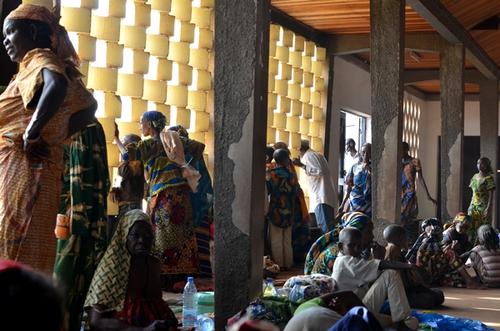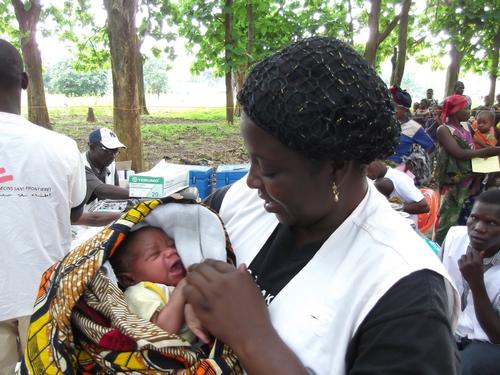A new eruption of violence has engulfed the Central African capital since 26 September. Despite the tension and insecurity Médecins Sans Frontières (MSF) teams are maintaining their presence and are treating the wounded who manage to arrive at the three MSF medical facilities in town.
Bangui – Sparked by the assassination of a motorbike taxi driver, retaliatory violence has spread through many other neighbourhoods of the capital. There have been large demonstrations against the current interim government, clashes (including against international peacekeeping forces*), mass crowd movements, roadblocks appearing in many locations, and buildings destroyed and looted (including compounds and bases of international NGOs).
MSF teams in the M’Poko displaced persons camp, the Castors maternity hospital and the Bangui General Hospital activated their emergency and mass casualty plans to respond to the influx of wounded. Between 26 and 28 September, 84 patients were treated or stabilized in the health centres at M’Poko and Castors. Over the same period, 97 wounded were admitted in the General Hospital, one of a very few reference hospitals in Bangui with trauma and surgical capacity. “Among the hundred or so wounded, 15 were severe cases and two were already dead when they arrived,” says Thomas Lauvin, MSF medical coordinator in the Bangui General Hospital. “Most had gunshot wounds, but we also treated people with wounds from hand-held weapons and grenade explosions. In total so far 45 patients have required surgery.”
“Because of the insecurity our ambulances can no longer move around town,” says Emmanuel Lampaert, MSF head of mission in CAR. “If possible, we try to organize for patient transfers to or from our facilities in taxis. But most of the sick and wounded patients now have to rely on their own means to cross town, either by foot or by motorbike. For example, on September 28 not a single woman came to the Castors maternity unit to give birth, although we usually provide around 30 safe deliveries there every day.”
On 27 September, with all access roads blocked, wounded from the neighbourhoods around ‘PK5’, Castors and M’Poko could not be transferred to the Bangui General Hospital and several people died while awaiting secondary medical care. “Given the situation around town, the number of wounded reaching our medical teams seems strangely low,” says Lauvin. “Unfortunately, we think right now many people have no way to reach the emergency medical care they need; they cannot safely move to health facilities, and we cannot move out to reach them.”
Another consequence of the violence and insecurity is a renewed movement of displaced people seeking safety – many people in Bangui have left their homes and moved into already-existing displaced persons (IDP) camps. The MSF team in M’Poko, a big IDP camp near the international airport, has seen several thousand people newly arriving over the past few days.
* MINUSCA and Sangaris forces





